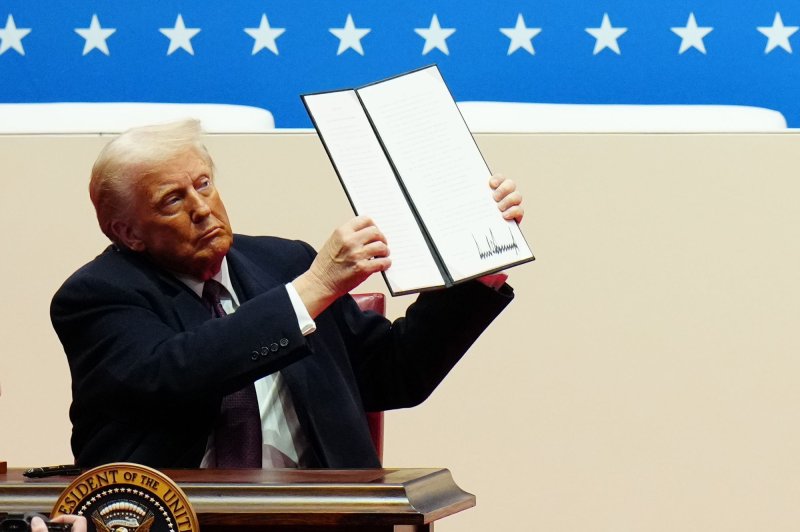President Donald Trump shows one of dozens of signed executive orders, including one limiting birthright citizenship, at the conclusion of ceremonies inside the Capital One Arena on Monday. Photo by Ken Cedeno/UPI |
License PhotoJan. 21 (UPI) — Attorneys general in 23 states have filed two legal challenges in federal courts seeking to halt President Donald Trump from limiting birthright citizenship for the children of immigrants and visitors.
Nineteen Democratic attorneys general filed a legal challenge in the U.S. District Court for Massachusetts, while attorneys general for Washington State, Illinois, Oregon and Arizona filed a challenge in the U.S. District Court for Western Washington.
The respective lawsuits say the president does not have the legal authority to rewrite the Constitution or the U.S. Immigration and Nationality Act.
Washington Attorney General Nick Brown is the lead plaintiff in the Western Washington District Court case.
“My commitment to this office and to all the people of Washington is we will be prepared,” Brown said Tuesday in an online announcement. “We will do everything in our power to defend the rights of Washingtonians.”
Washington Governor Bob Ferguson said state officials a year ago began preparing to challenge how the federal government might challenge birthright citizenship if Trump became president.
A resident of Kent, Wash., Monica Mendoza-Cawthon, is the daughter of Mexican immigrants and said the executive order affects her and millions like her.
“My parents came here with the promise of an American dream – the promise of freedom [and] of democracy,” Mendoza-Cawthon said. “Largely thanks to their sacrifices, I was able to become a first-generation college graduate and now a first-generation law school graduate.”
“Unfortunately, we are in a dark time in our national government, where the dreams of my parents are threatened to be taken away for so many people in the future,” she said.
The American Civil Liberties Union likewise on Monday filed a lawsuit challenging the legality of the executive order in the U.S. District Court of New Hampshire.
Trump on Monday signed the executive order eliminating automatic birthright citizenship for anyone born within U.S. borders.
The executive order is named “Protecting the Meaning and Value of American Citizenship.”
“The privilege of United States citizenship is a priceless and profound gift,” the order says, “but the 14th Amendment has never been interpreted to extend citizenship to everyone born within the United States.”
The 14th Amendment says, “All persons born or naturalized in the United States, and subject to the jurisdiction thereof,” are citizens of the United States.”
States ratified the 14th Amendment on July 9, 1968, to give citizenship to former slaves and their descendants and in support of the 13th Amendment that banned slavery throughout the United States.
“The 14th Amendment has always excluded from birthright citizenship persons who were born in the United States but not ‘subject to the jurisdiction thereof,'” the executive order says.
Congress has identified a “person born in the United States, and subject to the jurisdiction thereof” as a “national and citizen of the United States at birth,” according to the executive order.
The executive order says birthright citizenship does not apply to the children of mothers who unlawfully are in the United States and whose fathers are not U.S. citizens or lawful permanent residents.
The executive order also says the children of mothers who legally are in the United States on a temporary basis are not eligible for birthright citizenship, unless the fathers are U.S. citizens or lawful permanent residents.
The executive order does not limit birthright citizenship status for a month, which makes it possible for the respective federal district and appellate courts and the Supreme Court to rapidly address the matter.
Litigants anticipate the matter will go before the U.S. Supreme Court.
